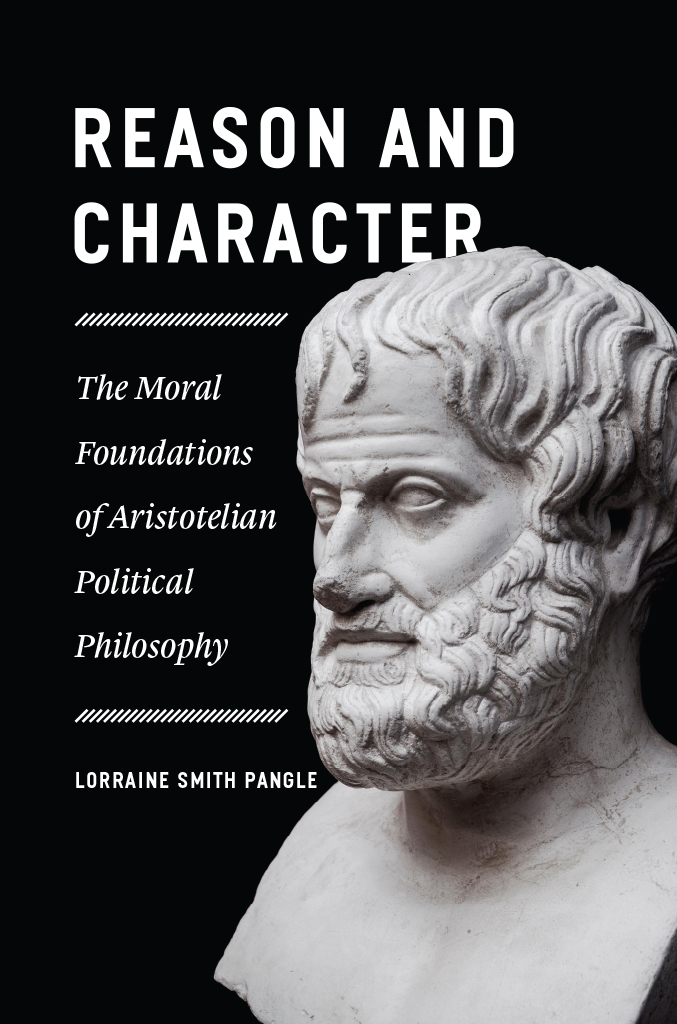
REASON AND CHARACTER
REASON & CHARACTER
The Moral Foundations of Aristotelian Political Philosophy
LORRAINE SMITH PANGLE
The University of Chicago Press
CHICAGO AND LONDON
The University of Chicago Press, Chicago 60637
The University of Chicago Press, Ltd., London
2020 by The University of Chicago
All rights reserved. No part of this book may be used or reproduced in any manner whatsoever without written permission, except in the case of brief quotations in critical articles and reviews. For more information, contact the University of Chicago Press, 1427 E. 60th St., Chicago, IL 60637.
Published 2020
Printed in the United States of America
29 28 27 26 25 24 23 22 21 20 1 2 3 4 5
ISBN-13: 978-0-226-68816-9 (cloth)
ISBN-13: 978-0-226-68833-6 (e-book)
DOI: https://doi.org/10.7208/chicago/9780226688336.001.0001
Library of Congress Cataloging-in-Publication Data
Names: Pangle, Lorraine Smith, author.
Title: Reason and character : the moral foundations of Aristotelian political philosophy / Lorraine Smith Pangle.
Description: Chicago : University of Chicago Press, 2020. | Includes bibliographical references and index.
Identifiers: LCCN 2019039051 | ISBN 9780226688169 (cloth) | ISBN 9780226688336 (e-book)
Subjects: LCSH: Aristotle. Nicomachean ethics. | Ethics, Ancient.
Classification: LCC B430.P255 2020 | DDC 171/.3dc23
LC record available at https://lccn.loc.gov/2019039051
 This paper meets the requirements of ANSI / NISO Z39.48-1992 (Permanence of Paper).
This paper meets the requirements of ANSI / NISO Z39.48-1992 (Permanence of Paper).
for Sophie
CONTENTS
What does it mean to live a good life? What does it mean to live a happy life? Can reason guide us to an answer to these questions? To what extent is reason sufficient to ensure that we live by the insights that it grasps? About these questions Aristotles Nicomachean Ethics has a great deal to say, much that we still can learn from, and, despite all the trees that have been felled and ink spilled in discussing them, more than a little that we still scarcely understand.
This book is a fresh examination of Aristotles teaching on the relation between reason and moral virtue in the Nicomachean Ethics, taking as its point of departure the oft-noted but still perhaps not sufficiently appreciated fact that this treatise is the first half of a two-volume work on political science.
Of course as long as there have been human beings they have had ideas of virtue and vice. From the earliest times those ideas centered on qualities essential for the defense and orderly functioning of the community. It is apt and revealing that, for example, the Greek term aret means both virtue generally and the one quality that simple communities naturally need most urgently and honor most highly, courage. Virtue thus comes to sight originally and most fundamentally as civic virtue. Virtue so understood is open to the charge Glaucon famously makes in book 2 of Platos Republic: why should I serve what is after all the good of everyone else, at a loss to myself? Platos best answer to this question is the alternative model of virtue he presents through his unforgettable depiction of his teacher and chief interlocutor, Socrates, the philosopher par excellence. Virtue so understood is the thoughtful quest for wisdom by one who seeks ever stronger assurance that wisdom is indeed possible and is the greatest human good; virtue is, moreover, the active exercise of such provisional wisdom as the philosopher has, good for himself and often for others as well. For such a man courage is chiefly courage of thought, moderation is the austerity that comes of treating the body as a mere instrument of the mind, piety means respectful but dogged questioning of the traditional accounts of the gods, and justice means prudential law-abidingness but above all the good order of ones own soul.
It is in this context that we can best understand the Platonic Socrates radical claim that virtue is knowledge. Especially if the best life is the philosophic life, if the greatest good is wisdom, might it not be that all virtue worthy of the name really reduces to wisdom? And is not real wisdomthorough, well digested knowledge of what is good and why, and what is bad and why, and how we are prone to deceiving ourselves and why it is so terribly foolish to do sopowerful enough to make itself efficacious in action? Indeed, is there not in wrongdoing of every sort a defective grasp of what is really good? Thus emerge the Socratic paradoxes in all their uncompromising strangenessthe claims that all who know the good will do the good; that vice is ignorance; that vice is involuntary; that virtue guarantees happiness; that tyrants have no power and do virtually nothing of what they wish; and that the proper remedy for crime is education, not punishment. Those claims I examine in Virtue Is Knowledge: The Moral Foundations of Socratic Political Philosophy, to which the present work is intended as a companion volume.
To all of these radical Socratic claims Aristotles ethical theory comes to sight as an eminently sober response. In the Nicomachean Ethics Aristotle acknowledges the importance of fortune as well as virtue for human happiness, and likewise the central place not only of understanding but of discipline, practice, and habituation in the cultivation of virtue. He repeatedly condemns the folly of people who take refuge in speeches instead of training themselves in virtue. Wisdom, he insists, is itself dependent on experience. To claim as Socrates does that virtue is knowledge is to ignore the critical part that healthy passions and good habituation play in shaping character; to claim that vice is ignorance and hence involuntary is to say what is neither true nor socially responsible. Aristotle insists that both virtue and vice are voluntary and that individuals are responsible for their characters. And he insists on the existence of akrasia, the failure of self-control in which one acts against ones better judgment, offering an extended and nuanced explanation of what it is and how it occurs.
As he thus parries the various thrusts of radical Socratic thought, Aristotle is engaged in the constructive project of forging traditional civic virtue and Socratic wisdom together into a new synthesis. In this account the individuals moral excellence is good for the political community but not chiefly aimed at the communitys good. Instead, the implicit priorities of civic virtue are largely reversed: it is the highest task of politics to promote the happiness of individuals, now understood to consist in activity in accordance with virtue. As moral virtue is not subordinate to politics, neither is it to philosophy, although Aristotles account of the moral life accords to reason a high place. Moral virtue is rather the perfection of a kalos kagathos, a serious individual who is both noble and good, a citizen but more than a citizen, a cultivated man of reason but less than a philosopher: a gentleman who will be most at home as a leading citizen of a free republic, but whose essential qualities and self-understanding and satisfactions are largely accessible to serious men and women in all times and places. Aristotles account of moral virtue reflects his judgment that human beings are by nature political but not wholly so, rational but not wholly so, beings who reach their fullest but rare perfection in a philosophic realm beyond politics, but who can also reach substantial fulfillment in political activity and considerable fulfillment likewise in the serious activities of private life. If the opportunity for the fullest and most challenging exercise of active wisdom in ruling or taking a leading part in republican self-government is available to few even in the best of times, it was already waning in Aristotles own time with the rise of Philip and Alexander of Macedon. Perhaps making a virtue of necessity, in the
Next page
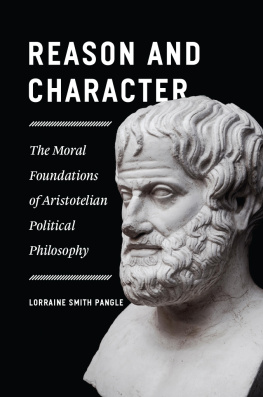

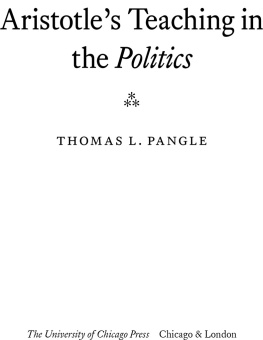
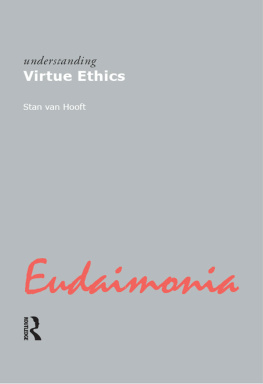
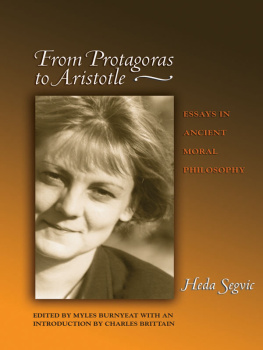

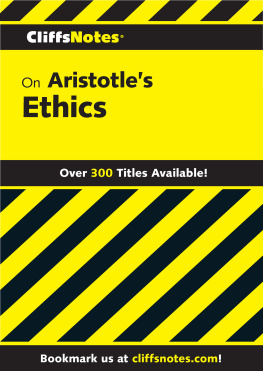
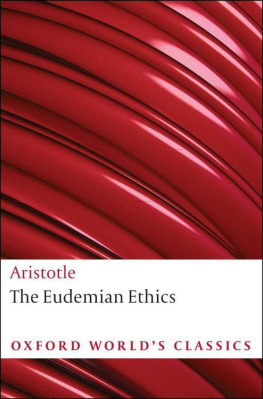
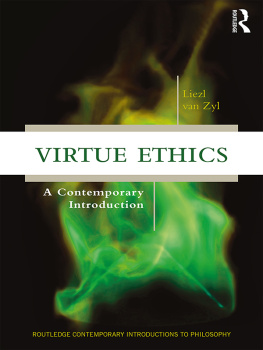
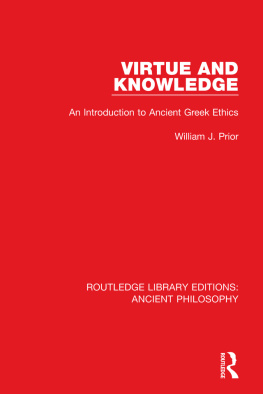
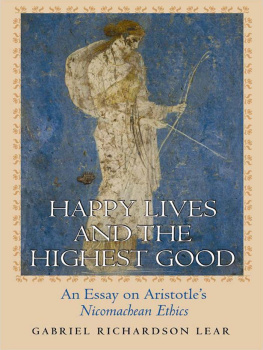


 This paper meets the requirements of ANSI / NISO Z39.48-1992 (Permanence of Paper).
This paper meets the requirements of ANSI / NISO Z39.48-1992 (Permanence of Paper).